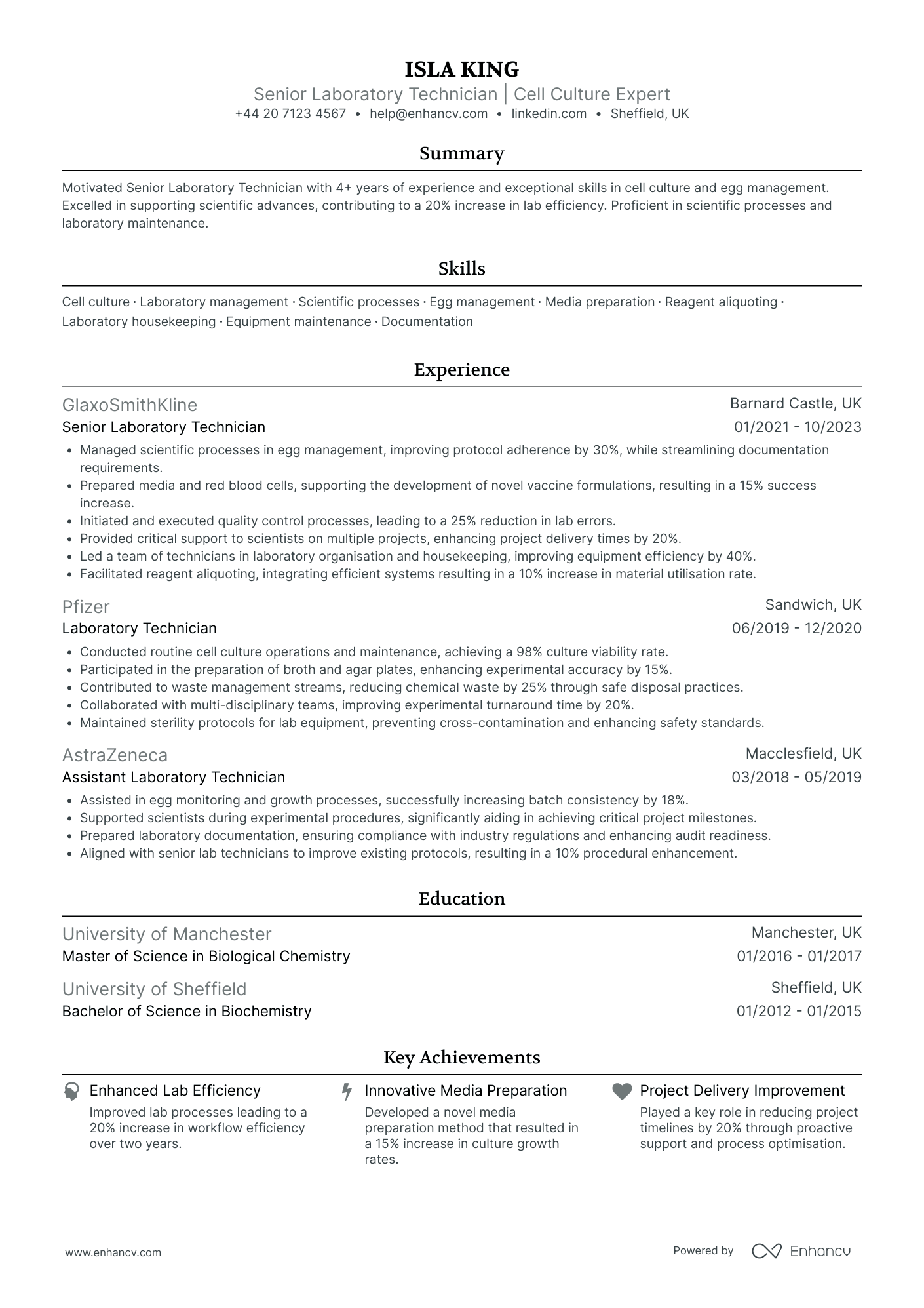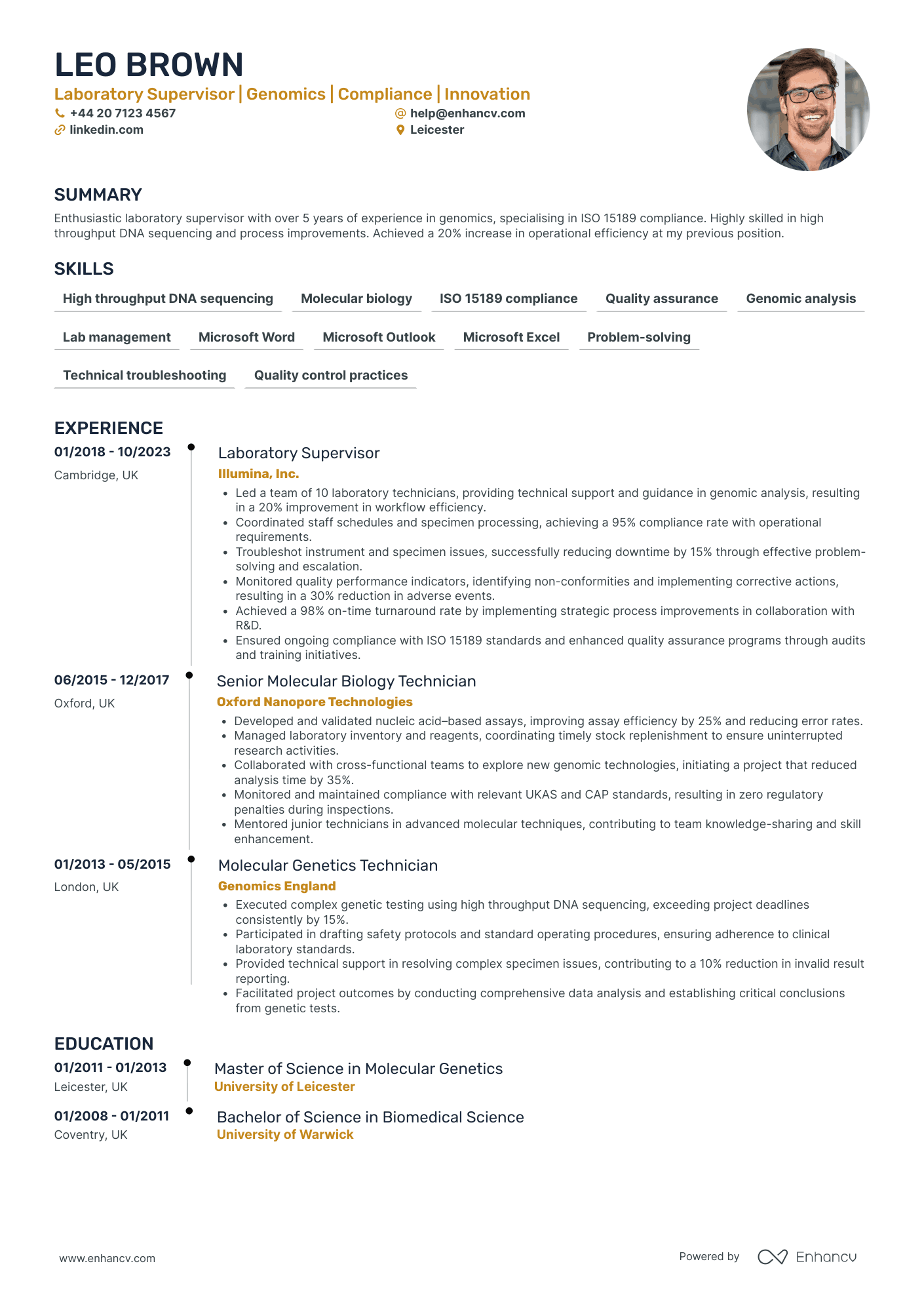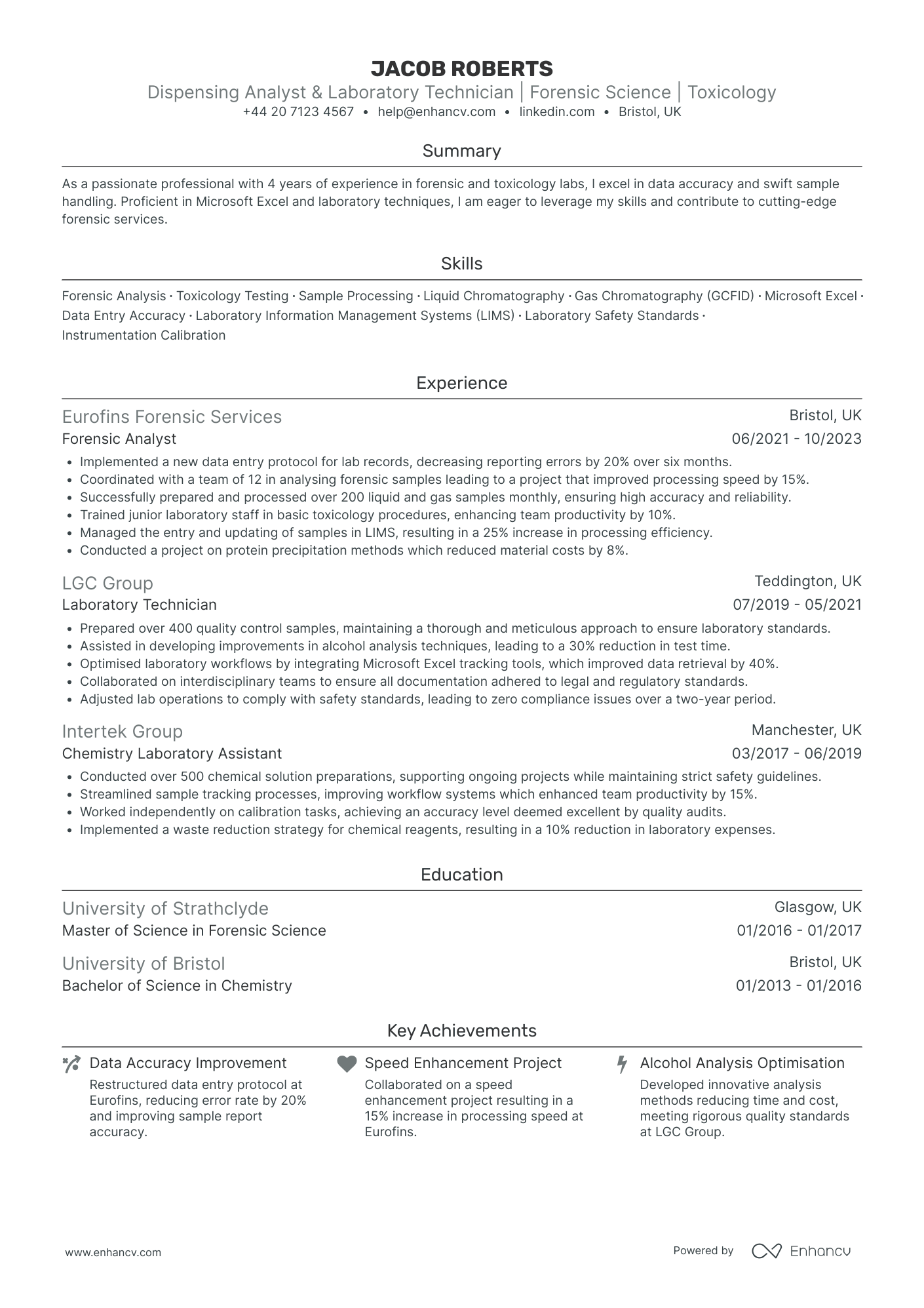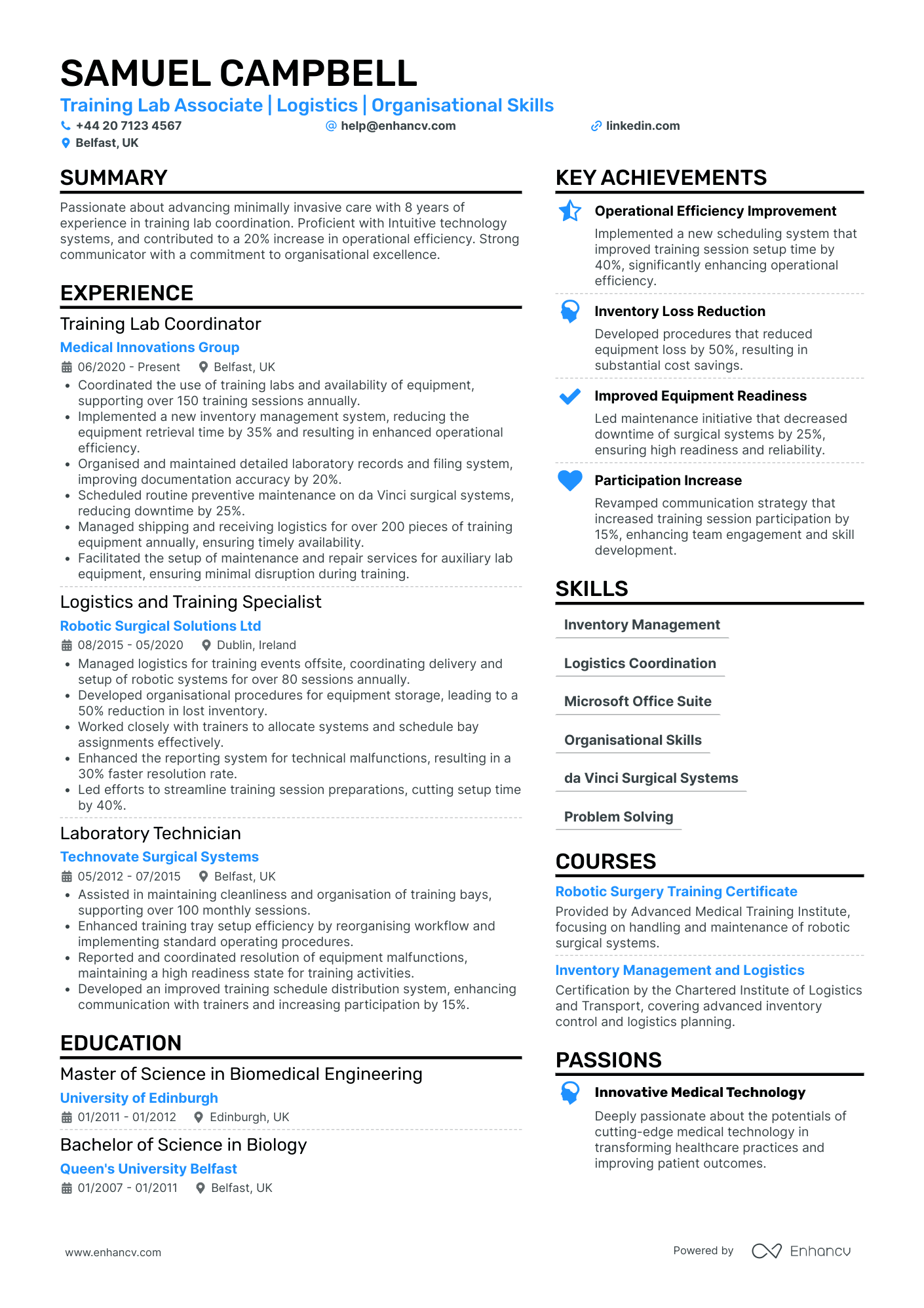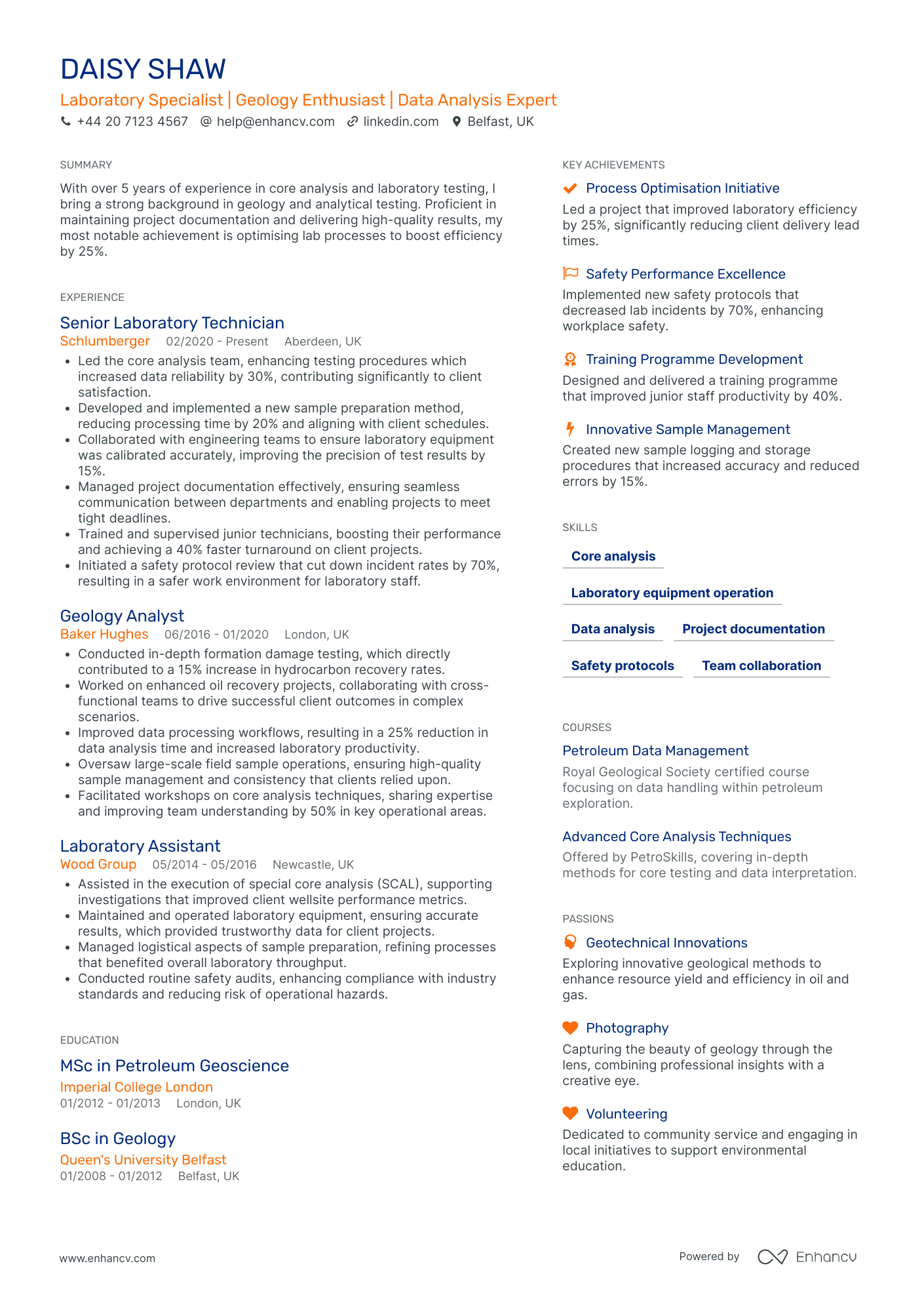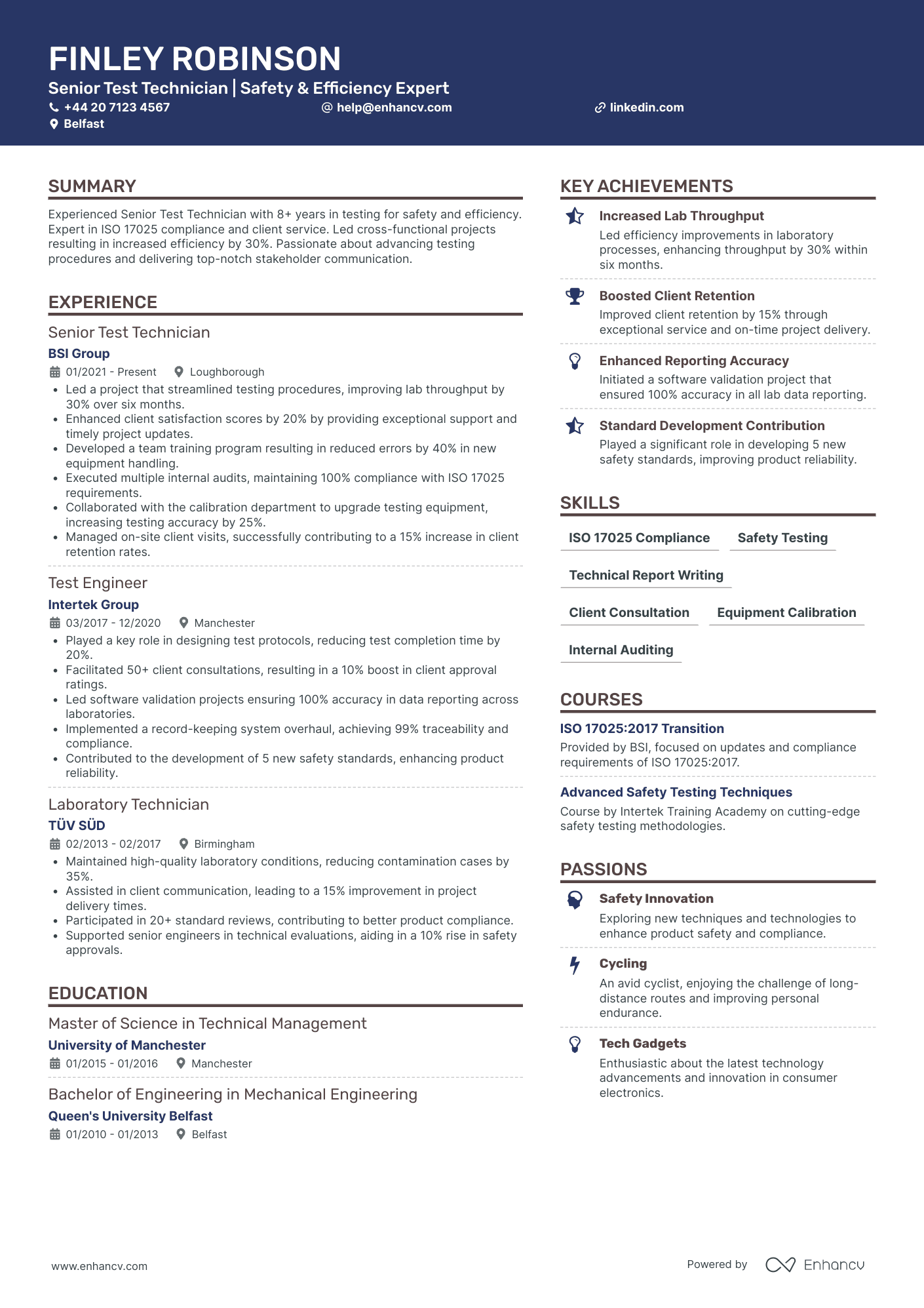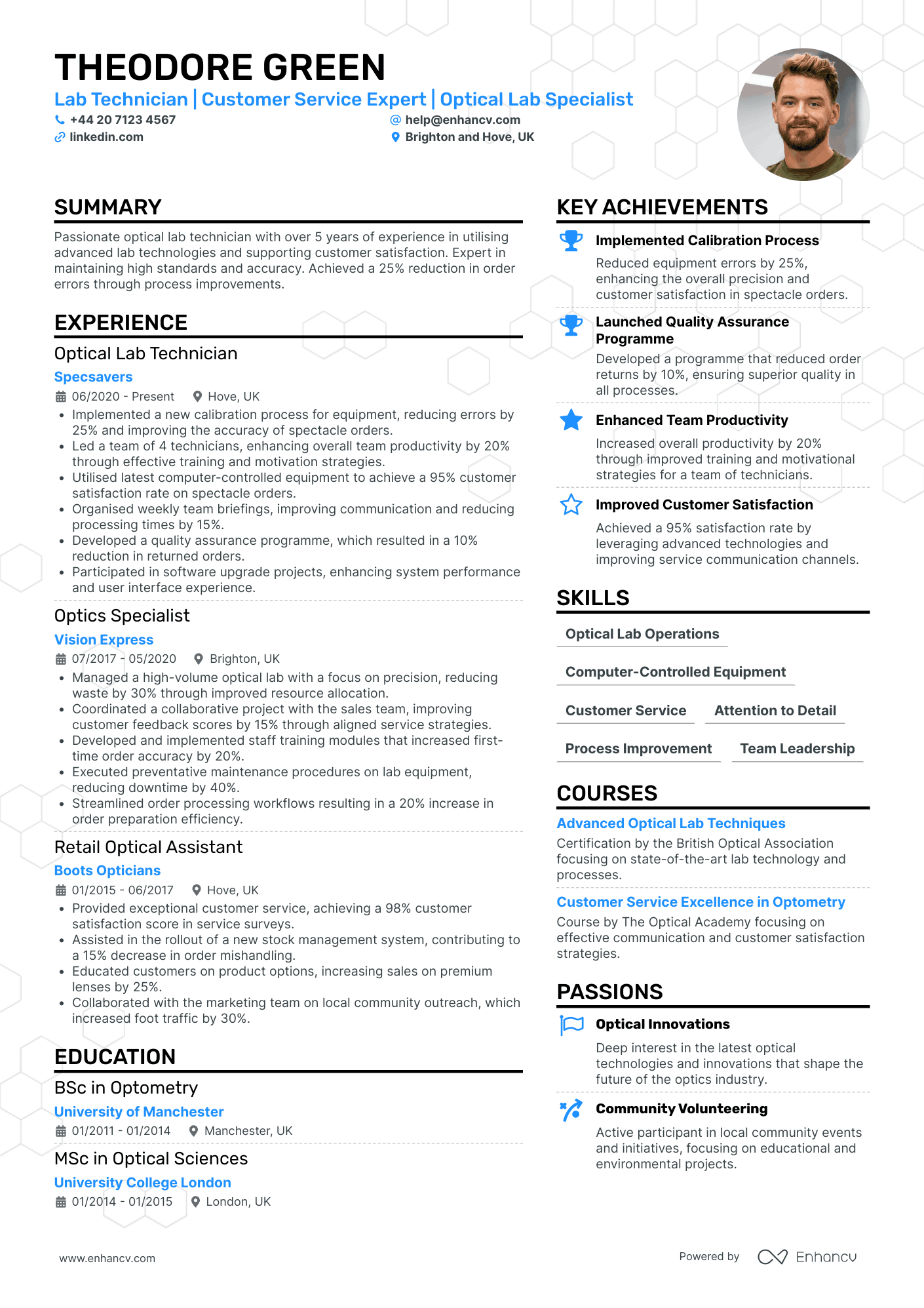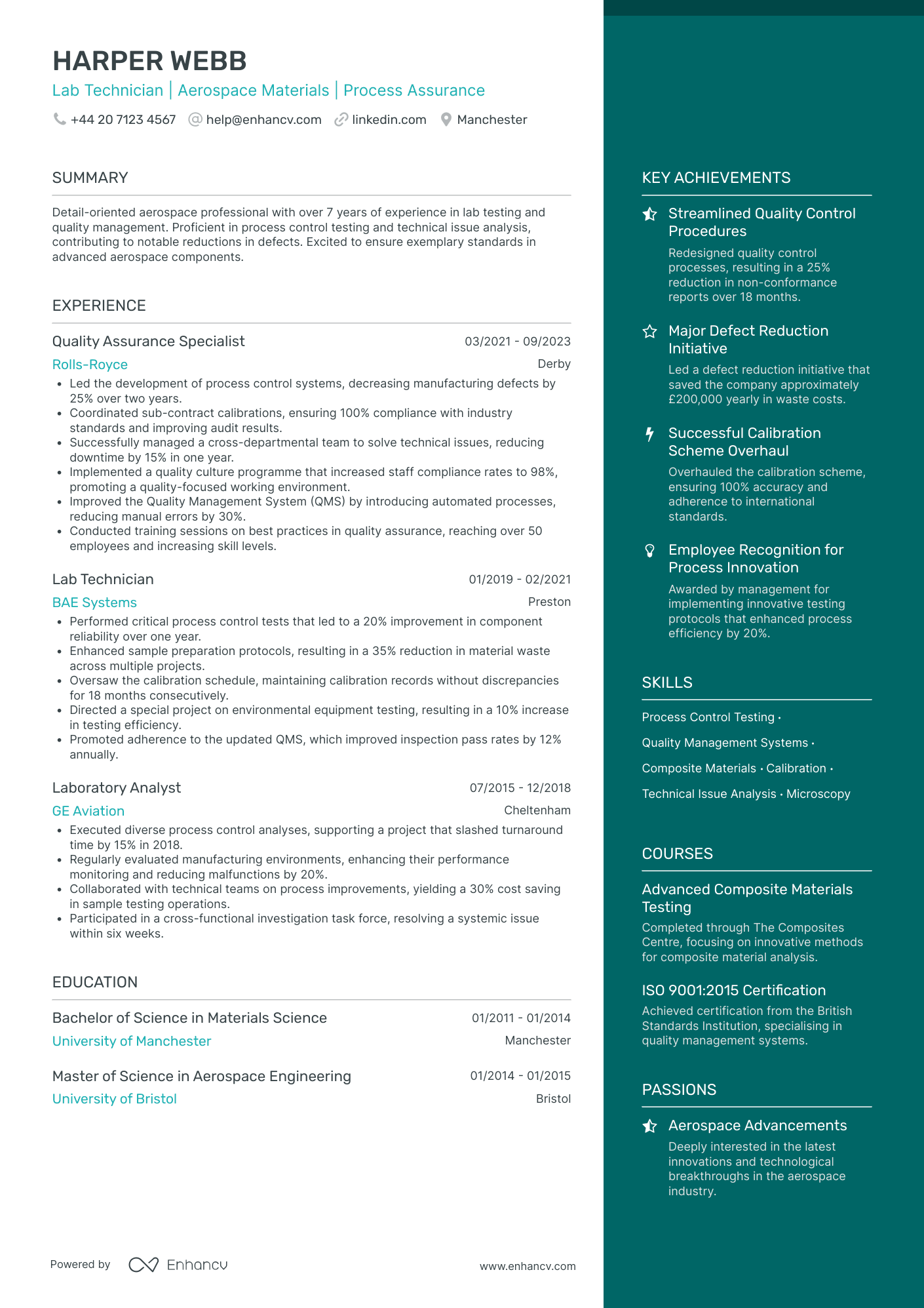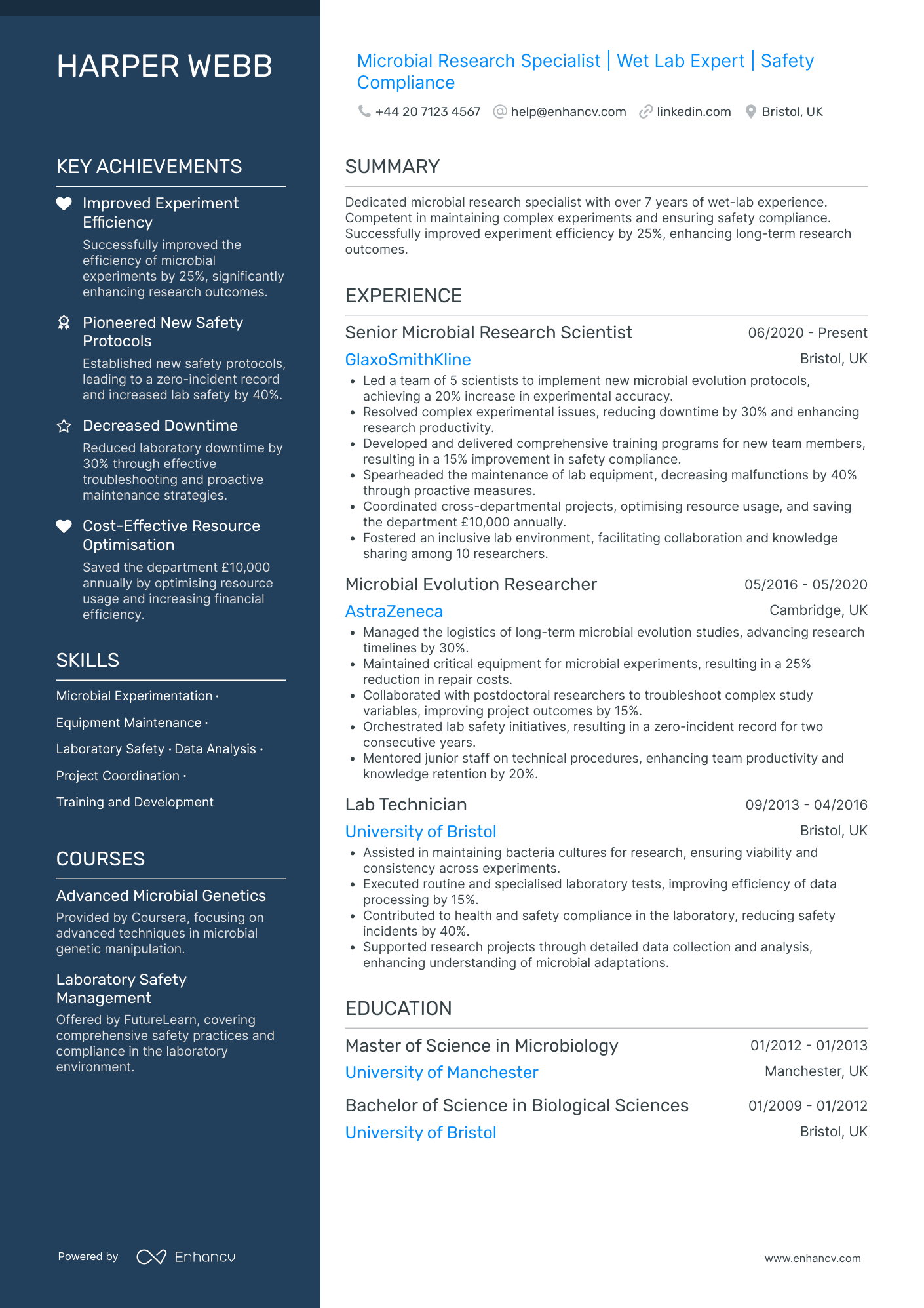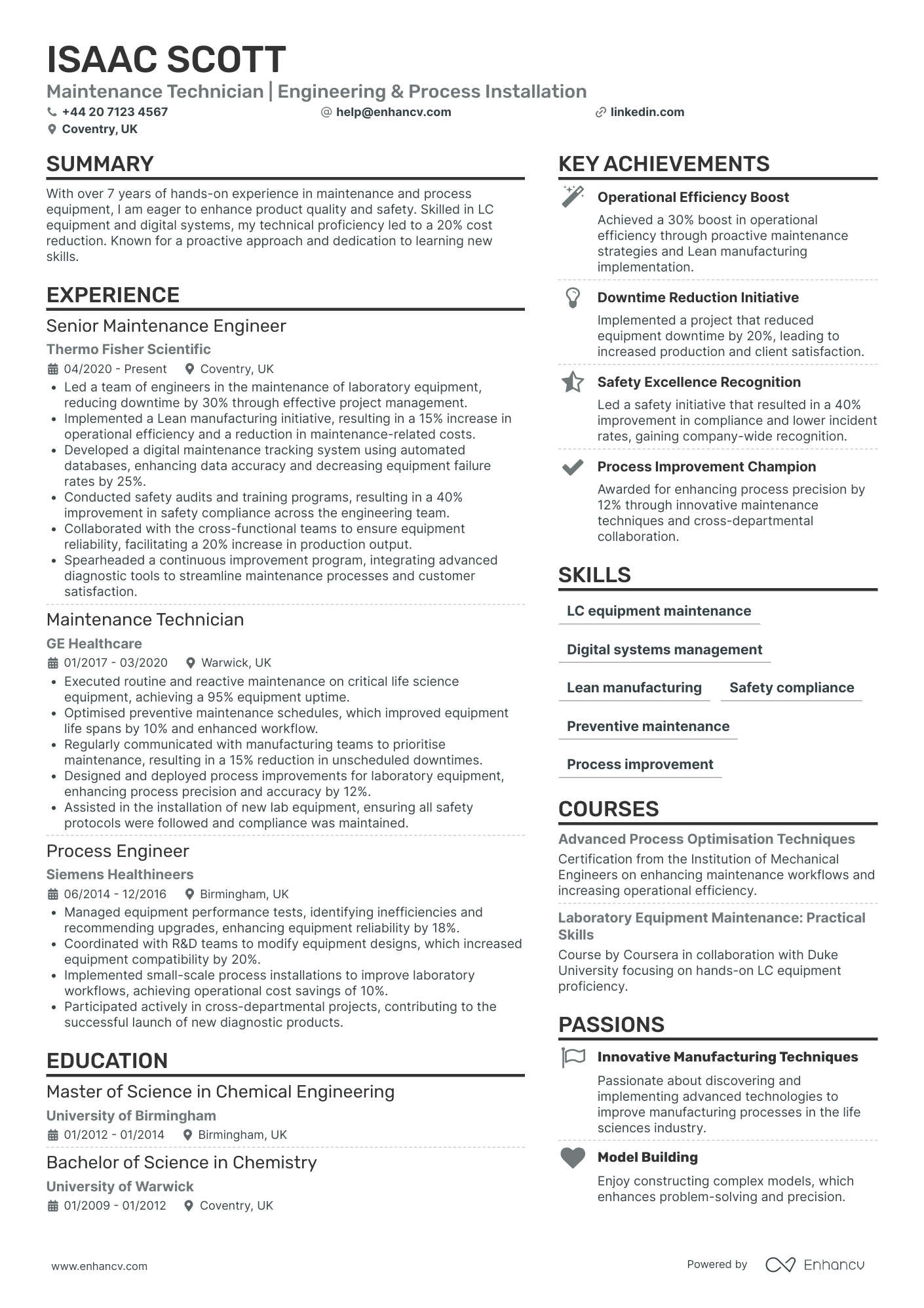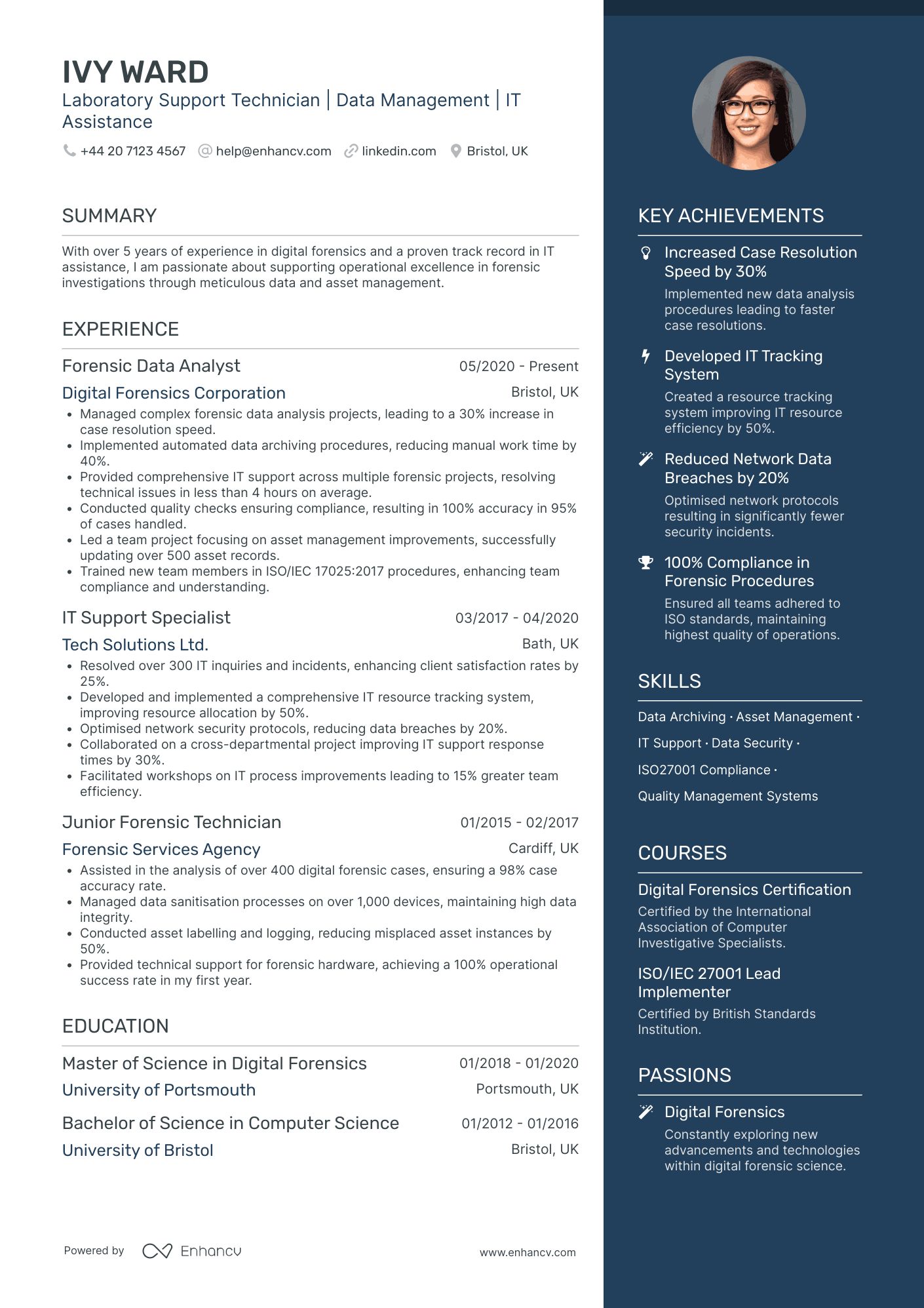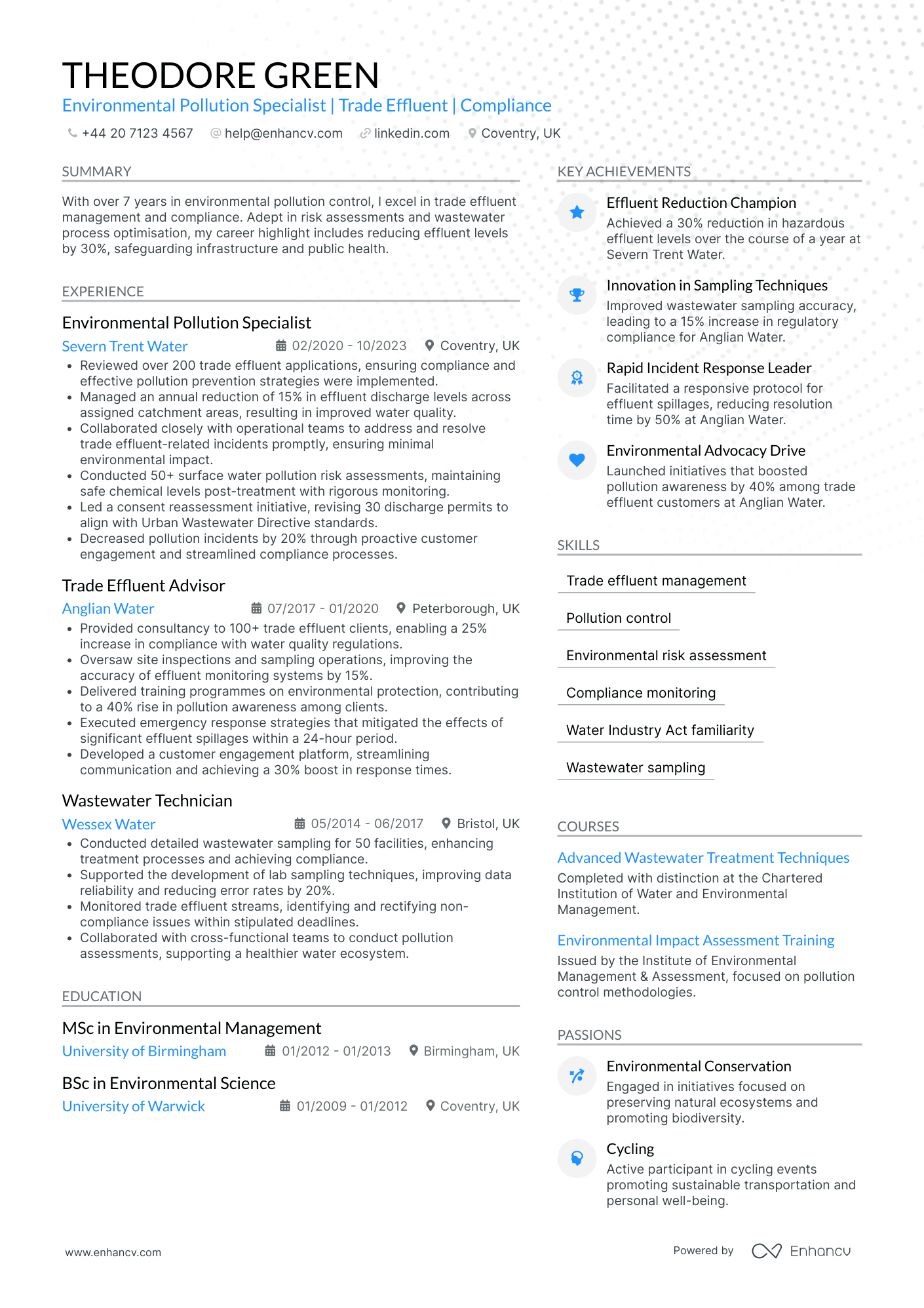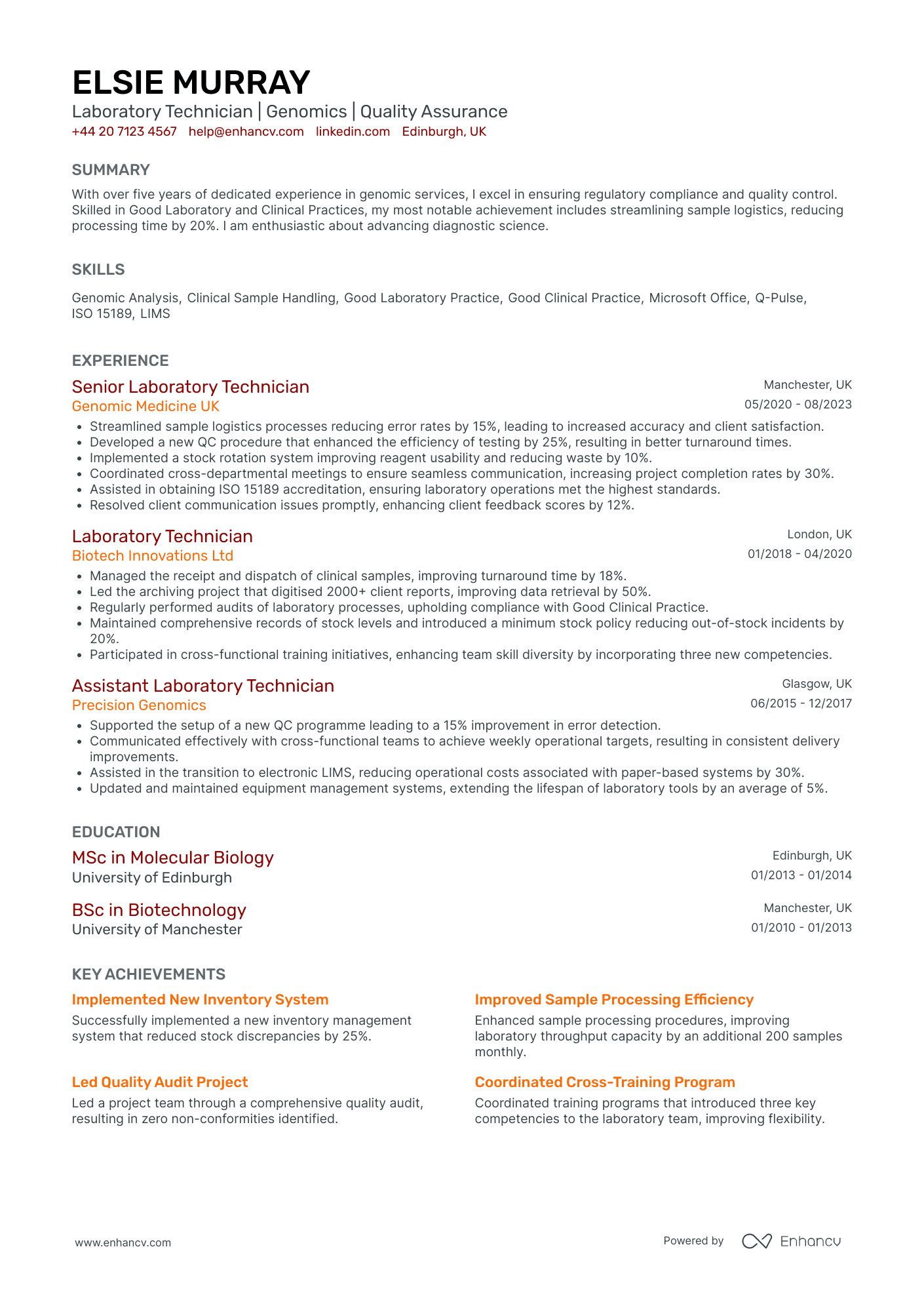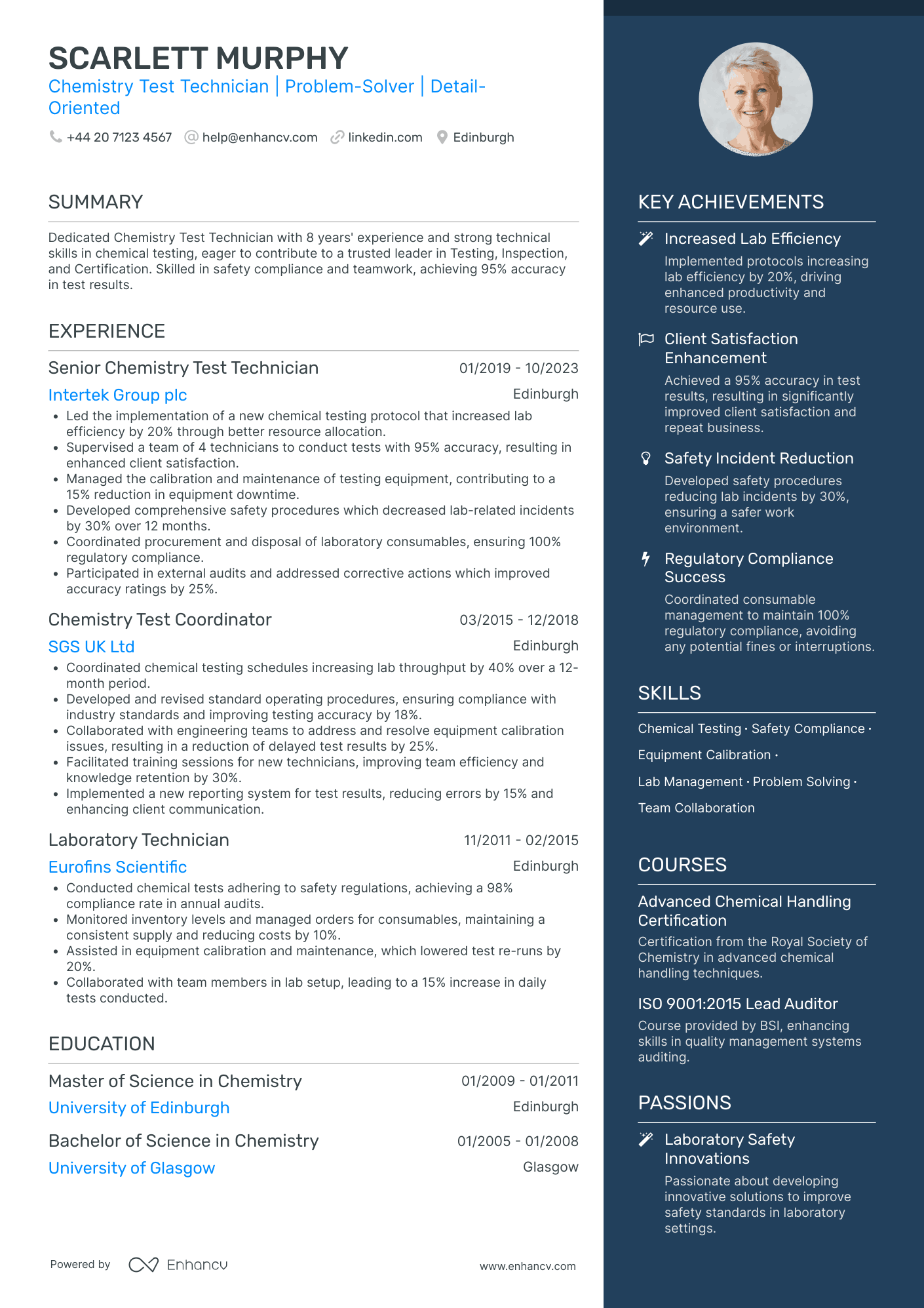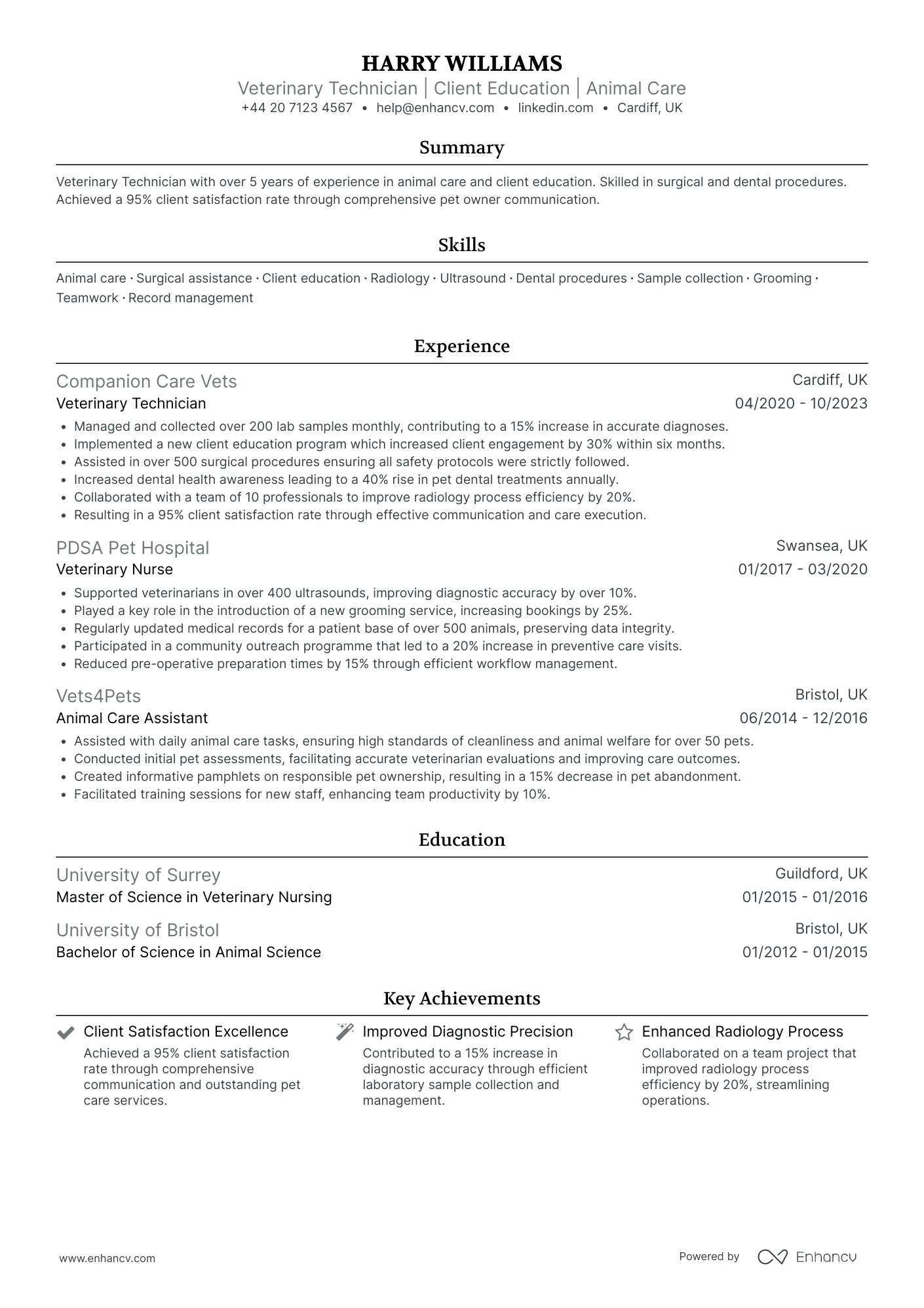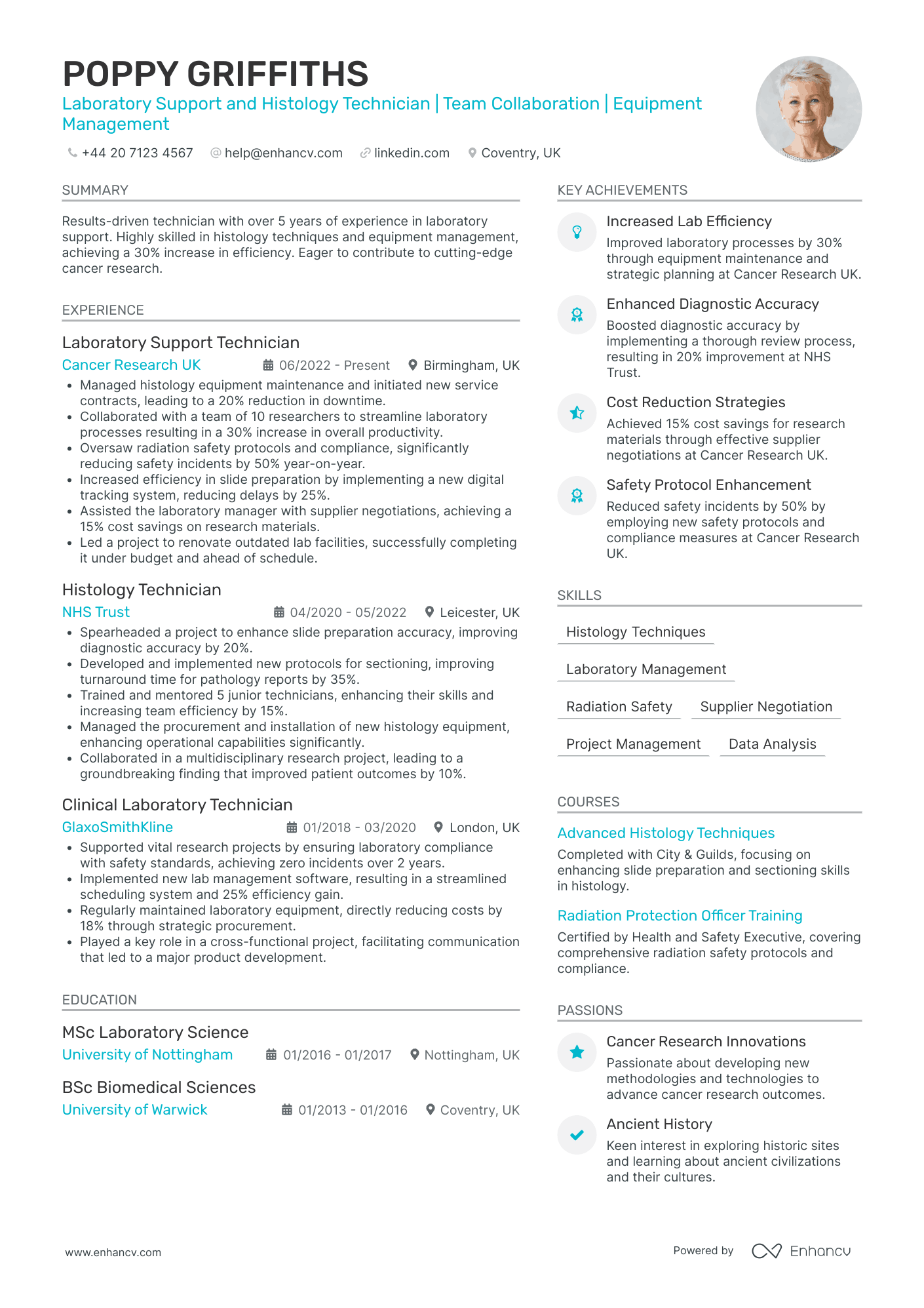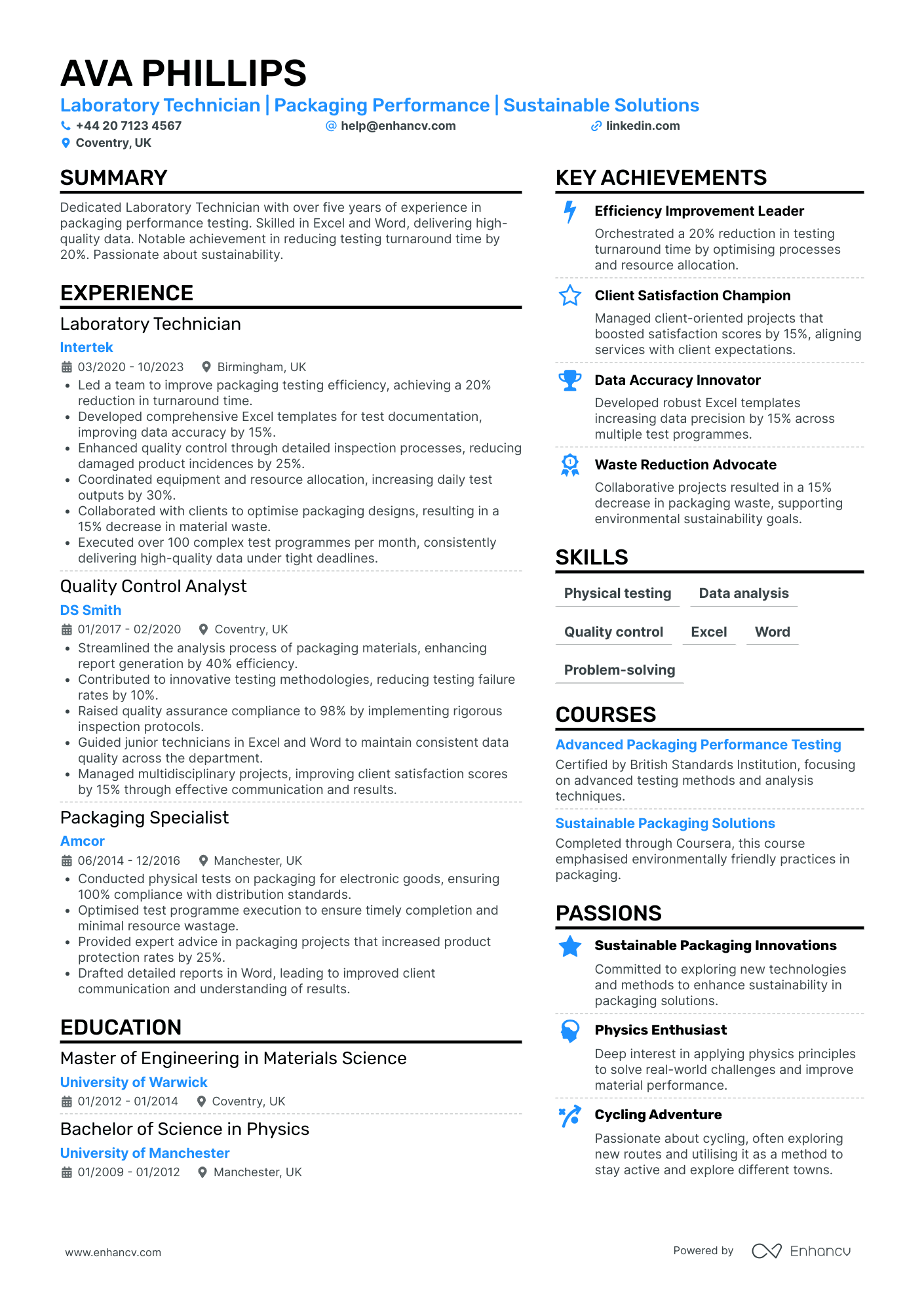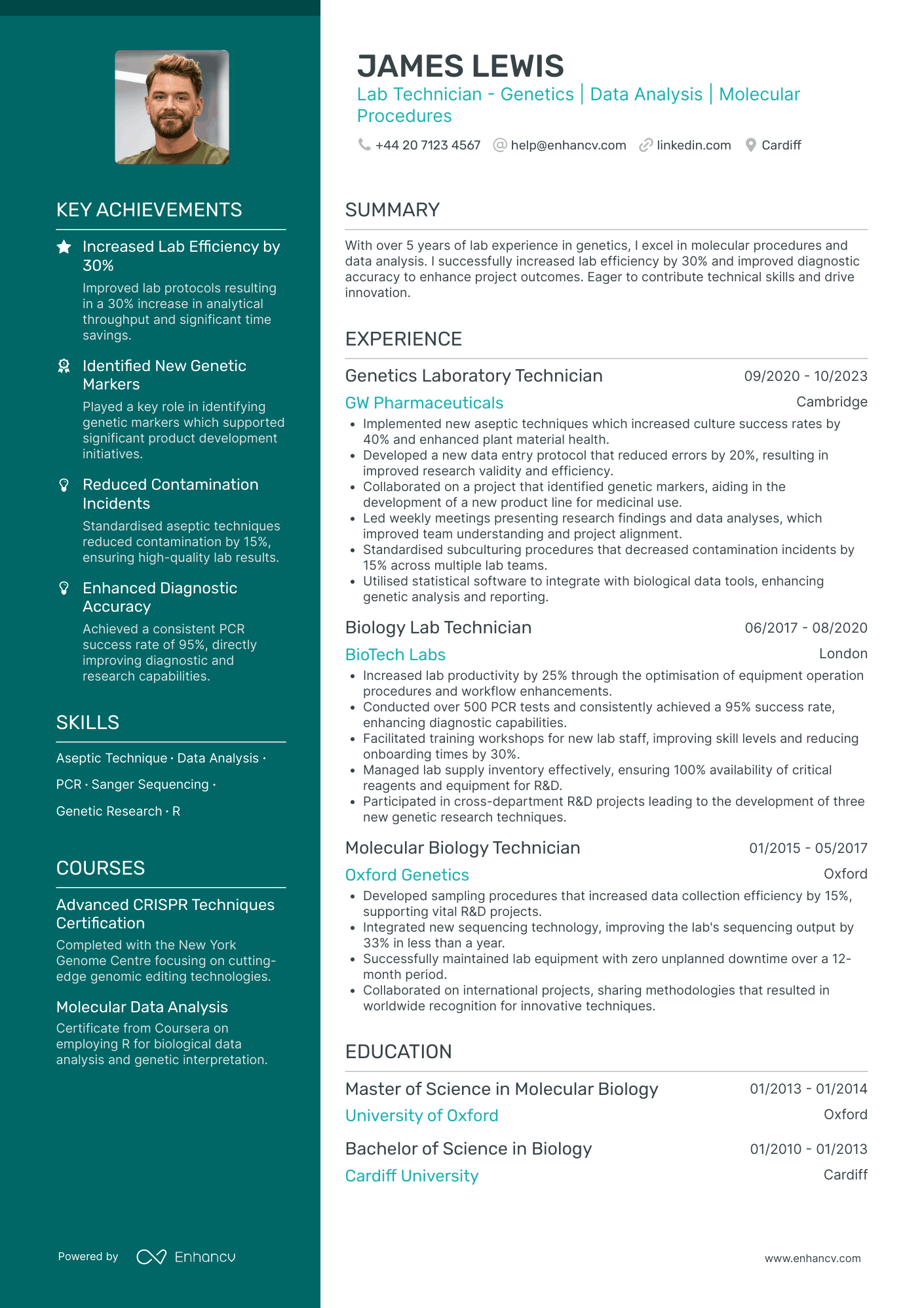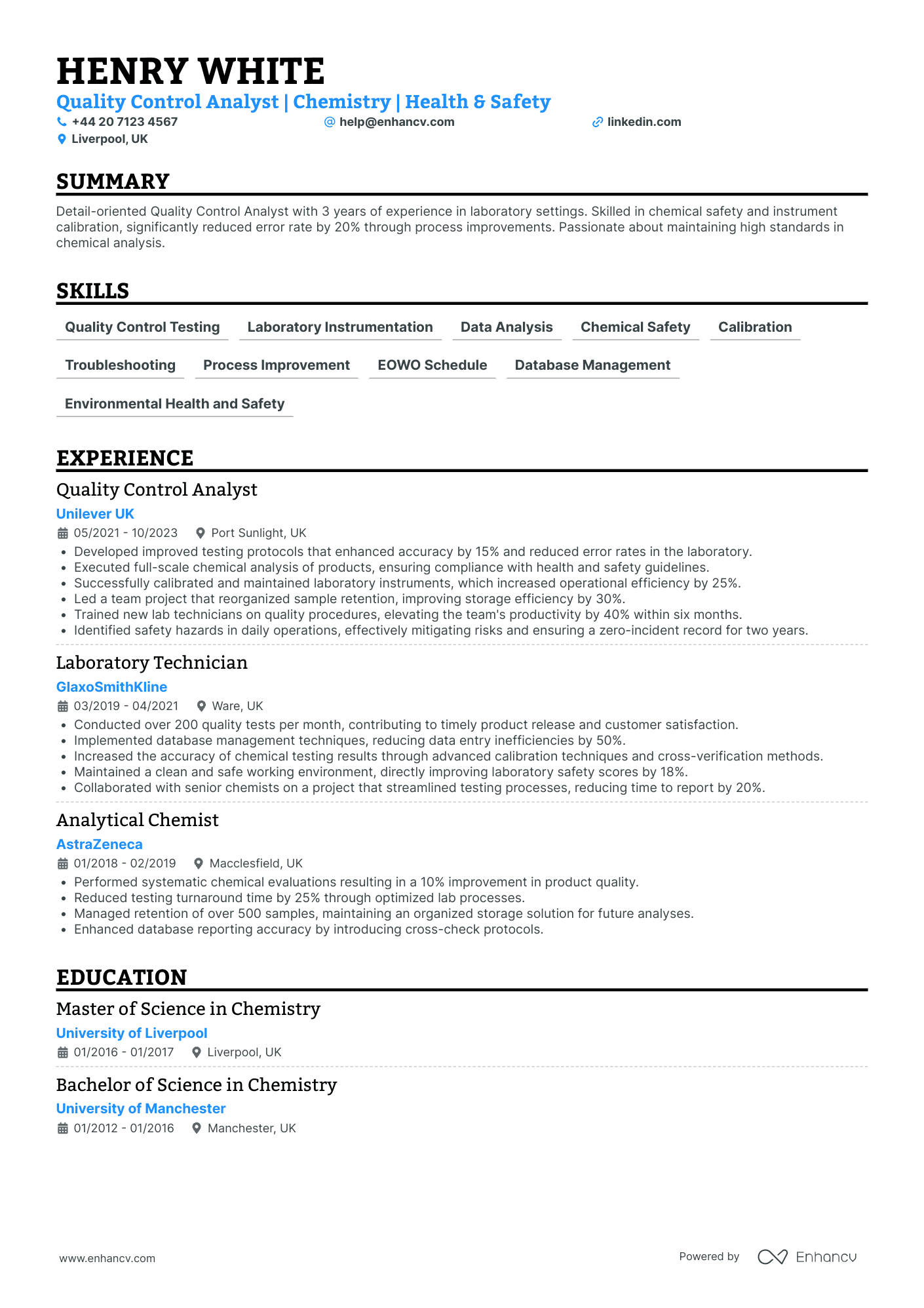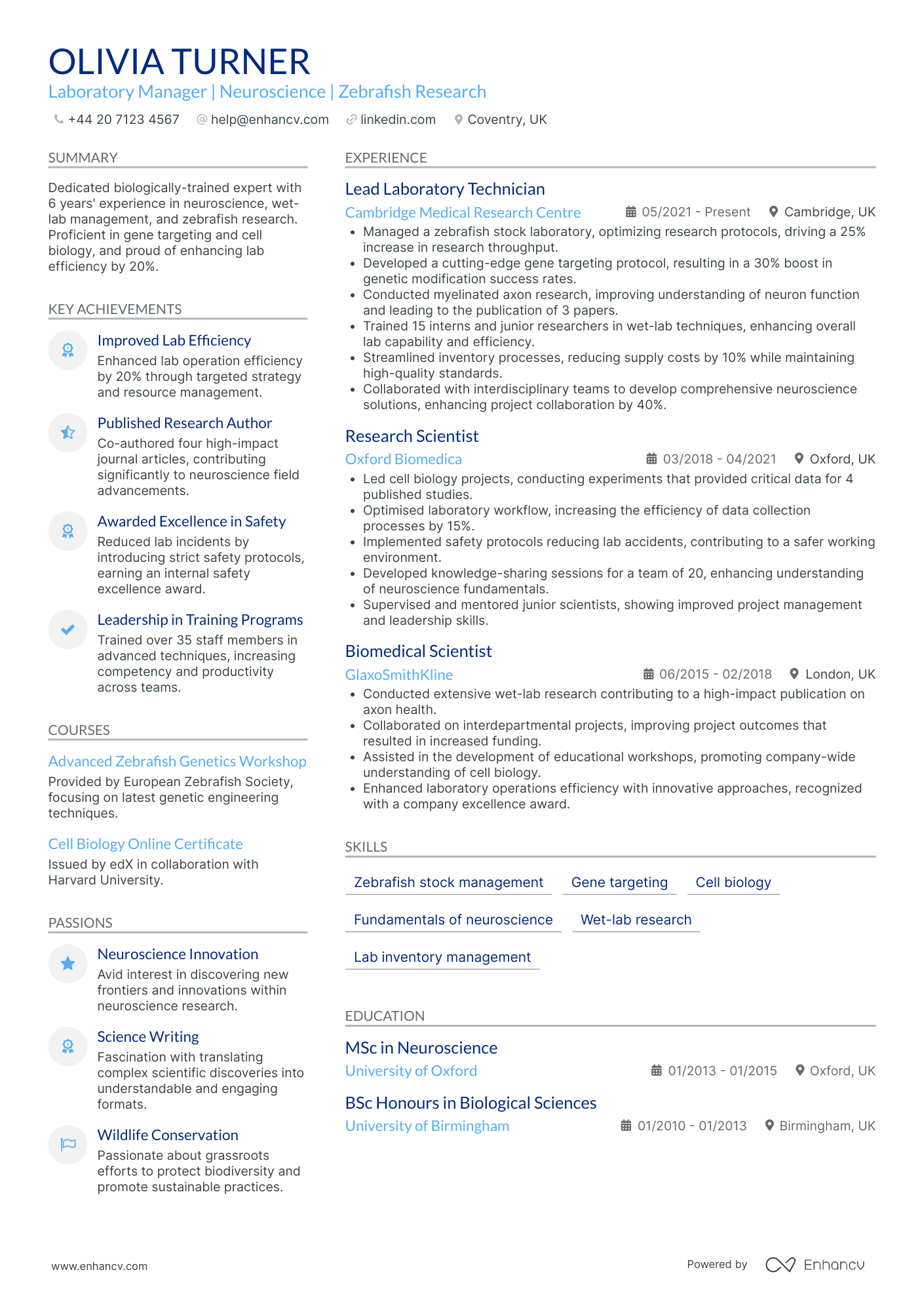One of the specific CV challenges you might face as a lab technician is articulating the technical skills and lab techniques you are proficient in. Our comprehensive guide can help you effectively highlight these competencies by providing targeted language and format suggestions that resonate with hiring professionals in the scientific community.
- Create an attention-grabbing header that integrates keywords and includes all vital information;
- Add strong action verbs and skills in your experience section, and get inspired by real-world professionals;
- List your education and relevant certification to fill in the gaps in your career history;
- Integrate both hard and soft skills all through your CV.
Discover more industry-specific guides to help you apply for any role in the links below:
CV examples for lab technician
By Experience
Senior Lab Technician
- Content presentation clarity and structure - The CV is structured with clear sections for each key area - professional experience, education, skills, courses, and achievements. Each section is concise, ensuring that all information is presented clearly and logically, facilitating easy navigation by potential employers.
- Progressive career trajectory - Isla King's career shows a clear upward trajectory, transitioning from an Assistant Laboratory Technician at AstraZeneca to a Senior Laboratory Technician at GlaxoSmithKline. This progression highlights her increasing responsibilities and expertise in the scientific and laboratory management fields.
- Unique industry-specific methodologies - The CV emphasizes Isla's deep technical knowledge in laboratory-specific processes, such as cell culture and egg management. Her achievements in media preparation, quality control processes, and novel vaccine formulations underline her technical acumen and contributions to the scientific community.
Lab Technician Supervisor
- Clear career progression and specialization - The CV effectively illustrates the candidate's advancement from a Molecular Genetics Technician to a Laboratory Supervisor, indicating a solid career trajectory in genomics. Each role is linked with increased responsibilities and the development of specialized skills in ISO 15189 compliance, showcasing progress and a deepening expertise in the field.
- Effective communication of industry-specific skills - The CV highlights a range of genomics-specific skills, such as high throughput DNA sequencing and quality control practices, demonstrating technical depth. The inclusion of completed courses in Advanced Genomic Technologies and ISO 15189 Compliance Training further reinforces the candidate’s commitment to maintaining cutting-edge knowledge in their industry.
- Measurable achievements with substantial impact - The CV stands out by providing quantifiable achievements, such as increasing lab efficiency by 20% and reducing adverse events by 30%, which underscores the candidate's ability to implement process improvements and enhance operational outcomes. These details emphasize the practical business impact of the candidate’s contributions, aligning with industry goals of efficiency and accuracy.
Entry Level Lab Technician
- Strategic Presentation of Skills and Experience - Jacob Roberts' CV is well-organized, beginning with contact information and a concise summary that effectively underscores his specialty in forensic science and toxicology. The document's structure facilitates easy navigation, with clearly defined sections for experience, education, and skills, allowing potential employers to quickly grasp his qualifications and career highlights.
- Impressive Career Growth in Forensic and Analytical Science - From his role as a Chemistry Laboratory Assistant to a Forensic Analyst, Jacob has shown a consistent upward trajectory in his career path within the forensic science industry. Over time, he has taken on increasing responsibilities, indicating significant career development and a deepening of his expertise in forensic analysis and laboratory operations.
- Implementation of Industry-Specific Tools and Techniques - The CV details Jacob's proficiency with specialized forensic tools and methodologies such as Gas Chromatography, Liquid Chromatography, and Laboratory Information Management Systems. These technical skills demonstrate his capability to conduct precise and reliable analyses, which are crucial in the field of forensic science. His education and additional courses further emphasize his commitment to staying updated with industry advancements.
Lab Technician Trainer
- Progressive Career Trajectory - Samuel Campbell's career demonstrates a clear progression within the medical training and logistics industry, moving from a Laboratory Technician to a Training Lab Coordinator. This trajectory highlights a consistent growth in responsibilities and expertise, underscoring a successful career in increasingly complex roles within healthcare technology.
- Strong Focus on Operational Efficiency - The CV stands out by showcasing significant achievements related to improving operational efficiency. Samuel's efforts in implementing new systems and procedures have led to substantial time reductions in equipment retrieval and downtimes, directly contributing to enhanced productivity and cost savings.
- Balanced Technical and Soft Skills - The CV effectively blends technical proficiencies in handling complex medical technologies like da Vinci Surgical Systems with strong soft skills such as organizational, communication, and problem-solving capabilities. This combination makes Samuel a versatile professional capable of both technical tasks and effective interpersonal interactions within a team.
Lab Technician Consultant
- Comprehensive career path with notable advancements - Daisy Shaw’s CV highlights a progressive career trajectory, starting as a Laboratory Assistant and moving up to a Senior Laboratory Technician. This progression not only showcases her growth within the industry but also emphasizes her ability to take on increased responsibility, making her a valuable asset to any laboratory team.
- Showcases a blend of technical and soft skills - The CV successfully illustrates Daisy’s capability in both technical proficiencies such as core analysis and data interpretation, alongside vital soft skills including team collaboration, communication, and time management. This combination indicates her ability to work efficiently in diverse work environments, collaborating across departments.
- Industry-relevant achievements with significant impact - Daisy’s accomplishments are presented not just as numbers but as impactful enhancements. For instance, the optimization of lab processes that improved efficiency by 25% and the reduction of incident rates by 70% through safety protocols speak volumes about her contribution to operational excellence and safety in workplace environments.
Lab Technician Team Leader
- Concise and Structured Experience - The CV presents the candidate's professional journey in a well-organized manner, detailing roles, companies, and accomplishments clearly. Each position highlights specific contributions without overwhelming the reader with unnecessary details, maintaining focus on outcomes.
- Proven Growth and Industry Engagement - Finley Robinson's career pathway reflects a strategic ascent, from a Laboratory Technician to a Senior Test Technician. This progression showcases a solid foundation in technical roles, supported by consistent promotions and responsibilities in safety testing across reputable organizations like BSI Group and Intertek Group.
- Adaptability in Technological and Compliance Evolutions - The CV emphasizes adaptability through participation in courses such as "ISO 17025:2017 Transition" and involvement in developing new safety standards. This illustrates the candidate's ability to integrate industry changes swiftly, ensuring compliance and safety in testing protocols.
By Role
Clinical Lab Technician
- Well-structured and concise presentation - The CV is neatly organized into sections such as experience, education, and skills, allowing for easy navigation and quick comprehension. The bullet points under each job title are concise yet informative, highlighting key responsibilities and achievements without overwhelming the reader with excessive details.
- Illustrates a clear career progression with industry focus - Theodore's career trajectory demonstrates steady growth, moving from a Retail Optical Assistant to an Optical Lab Technician, illustrating promotions and increased responsibilities within the optical field. This progression highlights his commitment to the industry and showcases his advancement in expertise and leadership roles over time.
- Emphasizes technical proficiency in optical lab operations - The CV underscores Theodore's expertise in using advanced, computer-controlled equipment and implementing process improvements to enhance accuracy and reduce errors. His methodical approach and technical depth in optical lab operations are presented as strengths that improve quality control and customer satisfaction.
Lab Quality Control Technician
- Comprehensive career progression in aerospace industry - Harper Webb's CV effectively demonstrates a strategic career development within the aerospace sector, showcasing growth from a Laboratory Analyst at GE Aviation to a Quality Assurance Specialist at Rolls-Royce. The career trajectory highlights a clear focus on increasingly complex roles with greater responsibilities, evidencing continuous professional development and enhanced expertise.
- Integration of advanced technical methodologies - The CV stands out with its emphasis on specialized techniques and tools pertinent to aerospace materials. Skills such as Process Control Testing, Calibration, and Statistical Process Control indicate a deep technical proficiency. Further, the inclusion of courses like "Advanced Composite Materials Testing" showcases dedication to remaining at the forefront of material testing innovations.
- Impactful achievements with measurable business outcomes - Harper Webb's CV is rich in accomplishments that convey significant business impacts. Highlighted achievements, such as a 25% reduction in manufacturing defects and a major defect reduction initiative saving £200,000 annually, illustrate not only effectiveness in role but also substantial contributions to improving operational efficiency and profitability within the organizations they served.
Microbiology Lab Technician
- Clear Content Presentation - The CV is well-structured and concise, presenting Harper Webb's qualifications and experience in an organized manner. Each section is clearly defined, making it easy for readers to navigate and identify key information quickly. Bullet points succinctly capture major achievements and responsibilities, enhancing readability and emphasis on important contributions.
- Impressive Career Trajectory - Harper Webb showcases a dynamic career progression, moving from a Lab Technician role to becoming a Senior Microbial Research Scientist at a leading pharmaceutical firm. This upward trajectory highlights significant growth and leadership skills, indicating a dedicated professional pathway within the field of microbiology and research, which is essential for roles requiring seasoned expertise.
- Significant Achievements and Impact - The CV compellingly focuses on impactful achievements, such as improving experiment efficiency by 25% and saving the department £10,000 annually through resource optimization. These accomplishments demonstrate not only technical proficiency but also an ability to drive substantial business outcomes, reinforcing Harper Webb's value in contributing to high-level organizational goals.
Lab Maintenance Technician
- Comprehensive Career Trajectory - The CV effectively outlines Isaac Scott's career progression through various significant roles in major engineering firms like Thermo Fisher Scientific and Siemens Healthineers. It depicts a clear growth path from Process Engineer to Senior Maintenance Engineer, showcasing his ability to take on increased responsibilities and leadership roles over time.
- Commitment to Innovation in Maintenance - The experience section highlights Isaac's strong focus on implementing advanced diagnostic tools and digital systems to reduce costs and equipment failure rates. This commitment to innovation is further supported by the mention of installing digital maintenance tracking systems which enhances efficiency significantly.
- Leadership and Cross-functional Collaboration - Isaac's leadership capabilities are well-demonstrated through his roles in leading engineering teams, conducting safety audits, and spearheading continuous improvement programs. His ability to collaborate effectively with cross-functional teams to boost equipment reliability and production output is a testament to his excellent interpersonal and leadership skills.
Forensic Lab Technician
- Clear and Structured Presentation - Ivy Ward's CV demonstrates a well-organized structure that ensures clarity and conciseness. The use of bullet points in the experience section makes it easy to comprehend Ivy's responsibilities and accomplishments, while efficiently showcasing key achievements and skills without overwhelming the reader with excessive detail.
- Career Growth and Specialization - Ivy shows a strong career trajectory with progression from a Junior Forensic Technician to a Forensic Data Analyst, illustrating significant growth and specialization within the forensic data industry. This progression highlights an increase in responsibilities and an expansion of expertise within a relatively short timeframe.
- Deep Industry-Specific Expertise - The CV highlights Ivy's expertise in forensic data analysis and IT support, underpinned by certifications like the Digital Forensics Certification and ISO/IEC 27001 Lead Implementer. Such specialized certifications suggest a high level of industry-specific knowledge and a commitment to maintaining professional standards within the field.
Environmental Lab Technician
- Comprehensive career progression - Theodore Green's CV demonstrates a clear and logical career trajectory within the environmental sector, highlighting growth from a Wastewater Technician to an Environmental Pollution Specialist. This progression underscores his increasing responsibility and expertise in pollution control and trade effluent management, reflecting a dedicated focus and advancement in his field.
- Technical proficiency and industry relevance - The CV effectively highlights industry-specific knowledge and tools, such as the Urban Wastewater Directive standards and advanced wastewater treatment techniques. This technical depth underlines Theodore’s specialized expertise in environmental pollution control, making him a valuable asset to any organization concerned with water quality and compliance.
- Impactful achievements with strategic relevance - Theodore's accomplishments are presented with a clear business impact narrative, such as reducing effluent discharge levels by 15% and cutting pollution incidents by 20%. These achievements not only quantify his contributions but also demonstrate his ability to influence broader corporate goals, like infrastructure protection and public health safeguarding.
Pharmaceutical Lab Technician
- Structured Career Progression - Elsie Murray's CV narrates a clear progression in her career, showcasing a steady ascent from Assistant Laboratory Technician to Senior Laboratory Technician. This journey highlights her commitment to professional development within the genomics field, reflecting both skill enhancement and leadership growth.
- Industry-Specific Expertise - The document references the application of industry-specific tools and methodologies, such as LIMS and ISO 15189, demonstrating deep technical competence essential for maintaining quality control and compliance in a genomics laboratory setting. These elements underline her capability to uphold industry standards and efficiency in laboratory operations.
- Emphasis on Achievements with Business Impact - Elsie’s achievements, like streamlining sample logistics and enhancing QC procedures, are not only presented with quantitative data to show efficacy but also provided in contexts that emphasize improvements in accuracy, client satisfaction, and project completion rates. This translates technical achievements into meaningful business impacts, affirming her value within any scientific team.
Chemistry Lab Technician
- Clearly Structured and Comprehensive Presentation - The CV is meticulously organized into sections that are easy to navigate, beginning with a concise and effective summary of the candidate’s core competencies and work experiences. Each section is well-delineated, enhancing readability and ensuring that crucial information is communicated succinctly, which is especially beneficial for recruiters who need to quickly grasp a candidate's qualifications.
- Demonstrates Robust Career Progression in Chemistry Testing - Scarlett Murphy's career trajectory reflects significant growth, moving from a Laboratory Technician to a Senior Chemistry Test Technician role. This progression signifies not only a deepening of technical expertise but also an increasing level of responsibility and leadership, underscoring her capability to handle advanced roles in the industry.
- Highlighted Achievements with Concrete Impact - Specific achievements, such as leading a new testing protocol that increased efficiency by 20%, are prominently featured, providing a tangible demonstration of her contributions to her employers. This focus on the impact of her work, such as improving client satisfaction through high testing accuracy, emphasizes the real-world benefits of her skills and actions.
Veterinary Lab Technician
- Structured Progression Through Diverse Roles - Harry Williams' career trajectory showcases a well-rounded progression through increasingly responsible roles in the veterinary field. Starting as an Animal Care Assistant and advancing to a Veterinary Technician, this path highlights significant professional growth and adaptability within the animal care sector. This advancement demonstrates a strong commitment to the field and a continuous enhancement of expertise and skills.
- Notable Achievements with Impactful Contributions - The CV outlines key achievements that underscore Harry’s contributions, such as the implementation of a client education program that boosted engagement by 30% and the pivotal role in a community initiative that increased preventive care visits. These accomplishments are not just about numbers; they reflect strategic initiatives with lasting impact on client relations and animal welfare, reinforcing his value as a proactive professional.
- Effective Communication and Collaborative Skills - The CV adeptly highlights Harry’s soft skills, especially in communication and teamwork. Achieving a 95% client satisfaction rate and collaborating with a team to improve radiology efficiency showcase his ability to work effectively within teams and maintain strong client relationships. These soft skills are critical in a service-oriented field like veterinary care, where outcomes heavily depend on clear communication and collaboration.
Histology Lab Technician
- Structured career growth with industry relevance - Poppy Griffiths has demonstrated a clear development trajectory across prestigious positions in renowned institutions like Cancer Research UK, the NHS Trust, and GlaxoSmithKline. This route emphasizes an increasing level of responsibility and technical expertise, moving from a Clinical Laboratory Technician to a Laboratory Support Technician specifically focusing on advanced cancer research technologies.
- Emphasis on technical adeptness and cutting-edge methodologies - The CV effectively showcases Poppy's technical depth, detailing her proficiency in histology techniques and use of digital tracking systems. This is reinforced by her accomplishments in improving diagnostic accuracy and streamlining lab processes, highlighting her capacity for integrating innovative solutions to boost operational efficacy.
- Achievements with significant impact on business outcomes - The document highlights a series of Poppy's achievements with tangible benefits, such as a 30% improvement in laboratory efficiency, and the successful reduction of safety incidents by 50%. These accomplishments are underscored by corresponding percentage improvements, which convey her ability to effectuate substantial enhancements in productivity, safety, and cost management.
Medical Lab Technician
- Clear and Organized Presentation - The CV's structure is highly organized, covering all key aspects succinctly with distinct sections for experience, education, skills, and achievements. The use of bullet points allows for easy readability, ensuring that the reader can quickly grasp Ava's qualifications and accomplishments.
- Comprehensive Career Progression - Ava's career trajectory showcases growth and specialization within the packaging and quality assurance industry. With a consistent advancement in roles from a Packaging Specialist to a Laboratory Technician, and significant responsibility increases, it highlights her expertise and commitment to her field.
- Industry-Specific Expertise and Impact - Highlighting Ava's skills in specific tools such as Excel for data templates and methodologies for reducing turnaround time emphasizes her technical depth. Her achievements in reducing material waste and enhancing testing efficiency showcase a significant business impact and alignment with sustainability goals within the industry.
Genetics Lab Technician
- Structured for Clarity and Effectiveness - The CV presents its content in a well-organized manner, starting with a succinct summary that clearly highlights the applicant's core competencies in genetics, data analysis, and molecular procedures. The use of clearly defined sections, such as experience, education, skills, and achievements, allows for easy navigation and comprehension of the candidate's qualifications and professional journey.
- Emphasizes Career Growth and Specialization - James Lewis’s career trajectory showcases significant growth in the field of genetics and laboratory work. Starting as a Molecular Biology Technician and advancing to a Genetics Laboratory Technician, each position evidences a progressive build-up of his technical expertise and responsibilities, demonstrating both vertical growth and depth of specialization in this field.
- Highlights Technical Proficiency and Achievements - The CV showcases valuable accomplishments related to industry-specific tools and methodologies, such as increasing lab efficiency, reducing errors, and improving diagnostic accuracy. These achievements not only highlight the candidate's technical adeptness but also underscore the tangible impact of their work on business performance and research capabilities.
Lab Instrumentation Technician
- Structured and Effective Presentation - The CV is well-organized, presenting information in a clear and comprehensive manner. It uses concise bullet points to emphasize key responsibilities and achievements, which makes it easy to navigate and understand. Each section is appropriately labeled, including a well-written summary, experience, education, skills, and certifications, all of which contribute to the overall clarity of the document.
- Demonstrated Career Progression - The trajectory shown in the CV reveals a steady and significant career progression within the quality control and chemistry fields. Starting from an Analytical Chemist role, the candidate moved into a Laboratory Technician position, and ultimately, a Quality Control Analyst, indicating a consistent growth in responsibility and expertise within acclaimed companies like AstraZeneca and Unilever UK.
- Emphasis on Impactful Achievements - The CV highlights specific achievements that align closely with business needs, such as increasing operational efficiency and reducing error rates. These accomplishments are presented with exact percentages, demonstrating not just the candidate's proficiency but also their direct impact on business outcomes. For instance, developing improved testing protocols that enhance accuracy by 15% and training initiatives resulting in productivity gains by 40% are reported, clearly signaling the value added to previous employers.
Biomedical Lab Technician
- Structured content presentation - The CV showcases a well-organized and concise format that highlights Olivia Turner's key skills, experiences, and achievements. Each section is clearly labeled, making it easy for a reader to navigate and understand the chronological career progression and relevant expertise within the neuroscience and zebrafish research field.
- Career trajectory emphasizing growth - Olivia Turner’s career trajectory is noteworthy for its focus on progressively responsible roles within prominent research institutions. Starting as a Biomedical Scientist and advancing to a Laboratory Manager, her growth illustrates a consistent increase in responsibility, expertise in neuroscience, and leadership experience, indicating a professional dedicated to advancing in her field.
- Integration of industry-specific methodologies - The CV highlights specialized methodologies in neuroscience and zebrafish research, such as the development of a cutting-edge gene targeting protocol and efficient zebrafish stock management. These details reflect a deep technical expertise and dedication to employing advanced methodologies to drive significant research outcomes within her field.
How to ensure your profile stands out with your lab technician CV format
It's sort of a Catch 22. You want your lab technician CV to stand out amongst a pile of candidate profiles, yet you don't want it to be too over the top that it's unreadable. Where is the perfect balance between your CV format simple, while using it to shift the focus to what matters most. That is - your expertise. When creating your lab technician CV:
- list your experience in the reverse chronological order - starting with your latest roles;
- include a header with your professional contact information and - optionally - your photograph;
- organise vital and relevant CV sections - e.g. your experience, skills, summary/ objective, education - closer to the top;
- use no more than two pages to illustrate your professional expertise;
- format your information using plenty of white space and standard (2.54 cm) margins, with colours to accent key information.
Once you've completed your information, export your lab technician CV in PDF, as this format is more likely to stay intact when read by the Applicant Tracker System or the ATS. A few words of advice about the ATS - or the software used to assess your profile:
- Generic fonts, e.g. Arial and Times New Roman, are ATS-compliant, yet many candidates stick with these safe choices. Ensure your CV stands out by using a more modern, and simple, fonts like Lato, Exo 2, Volkhov;
- All serif and sans-serif fonts are ATS-friendly. Avoid the likes of fancy decorative or script typography, as this may render your information to be illegible;
- Both single- and double-column formatted CVs could be assessed by the ATS;
- Integrating simple infographics, icons, and charts across your CV won't hurt your chances during the ATS assessment.

PRO TIP
Use font size and style strategically to create a visual hierarchy, drawing the reader's eye to the most important information first (like your name and most recent job title).

The top sections on a lab technician CV
- Professional Summary showcases your experience and goals in a brief paragraph, drawing attention to your most relevant qualifications and intentions for the lab technician role.
- Technical Skills section demonstrates your proficiency in specific laboratory techniques, instruments, and software essential for lab work.
- Work Experience details your previous roles and responsibilities, demonstrating your hands-on experience and achievements in laboratory settings.
- Education and Certifications highlight your formal training, degrees, and any special certifications you hold that are pertinent to laboratory work.
- Laboratory Projects outline any notable projects or research you've undertaken, showing your ability to apply skills in practical situations.

What recruiters value on your CV:
- Highlight any laboratory experience or technical skills, such as familiarity with analytical techniques, instrumentation or data management systems, which are highly relevant to the role of a lab technician.
- Detail any relevant qualifications or certifications specific to lab work, like a degree in a scientific field, a laboratory technician certification or health and safety training, as this demonstrates your foundational knowledge.
- Include any experience with quality control and assurance, emphasising your attention to detail and understanding of the protocols necessary to maintain lab standards.
- Mention your ability to write reports and manage laboratory documentation, which is crucial for ensuring the traceability and reproducibility of results in a lab setting.
- Touch upon your communication and teamwork skills, as working effectively with other scientists and technicians is essential for successful laboratory operations and research outcomes.
Recommended reads:
Our checklist for the must-have information in your lab technician CV header
Right at the very top of your lab technician CV is where you'd find the header section or the space for your contact details, headline, and professional photo. Wondering how to present your the name of the city you live in and the country abbreviation as your address;
- are tailored to the role you're applying for by integrating key job skills and requirements;
- showcase what your unique value is, most often in the form of your most noteworthy accomplishment;
- select your relevant qualifications, skills, or current role to pass the Applicant Tracker System (ATS) assessment. Still not sure how to write your CV headline? Our examples below showcase best practices on creating effective headlines:

Examples of good CV headlines for lab technician:
- Senior Laboratory Technician | BSc Biochemistry | 7+ Years in Molecular Biology | Quality Control Specialist
- Certified Lab Technician | Microscopy Expertise | 5 Years Applied Research | MSc Biomedical Science
- Lead Clinical Lab Technologist | Haematology & Immunology | 10+ Years Experience | Phlebotomy Certified
- Junior Laboratory Assistant | BSc (Hons) in Genetics | Enthusiastic in Genetic Sequencing | GCP Trained
- Technical Lab Manager | 12 Years in Pharmaceutical Analysis | MSc Organic Chemistry | Lean Six Sigma
- Forensic Lab Analyst | Forensic Science BSc | 4 Years DNA Profiling | Expert in Toxicology
Choosing your opening statement: a lab technician CV summary or objective
At the top one third of your CV, you have the chance to make a more personable impression on recruiters by selecting between:
- Summary - or those three to five sentences that you use to show your greatest achievements. Use the CV summary if you happen to have plenty of relevant experience and wish to highlight your greatest successes;
- Objective - provides you with up to five sentences to state your professional aims and mission in the company you're applying for

CV summaries for a lab technician job:
- Accomplished Laboratory Technician with over 8 years of experience in clinical diagnostics and a solid background in biochemistry. Skilled in operating high-throughput analysers, maintaining strict quality controls, and contributing to critical research resulting in three published studies in renowned medical journals.
- Detail-oriented professional with 10 years of expertise in forensic science, now seeking to transfer the rigorous analytical and documentation skills acquired to a challenging environment in medical laboratory technology. Adept at evidence analysis and interpretation, with a proven track record of meticulous data management.
- A budding Biotechnology graduate keen to apply the theoretical knowledge and hands-on laboratory experience gained through a recent internship at a top-notch research facility. Eager to expand practical skills in clinical laboratory settings and contribute to meaningful scientific advancements.
- Environmental scientist with 6 years of field and laboratory work in pollutant analysis, transitioning into the medical lab tech space. Proficient in various analytical methods and instrumental techniques, offers a unique perspective on sample processing and quality assurance procedures.
- As a recent graduate from the University of XYZ with a BSc in Microbiology, I am eager to launch my career in laboratory sciences. Enthusiasm for learning advanced technological methodologies and a steadfast commitment to accuracy in data recording and specimen handling mark my quest for excellence.
- Dedicated individual with a robust foundation in Health Science seeks to delve into the role of a Lab Technician. Keen on applying strong analytical skills, attention to detail, and unwavering resolve to ensure precision in test results and laboratory operations gained from extensive academic coursework and laboratory simulations.
More detailed look into your work history: best advice on writing your lab technician CV experience section
The CV experience is a space not just to merely list your past roles and responsibilities. It is the CV real estate within which you could detail your greatest accomplishments and skills, while matching the job requirements. Here's what to have in your experience section:
- Prove you have what the job wants with your unique skill set and past successes;
- Start each bullet with a strong, action verb, and continue with the outcome of your responsibility;
- Use any awards, nominations, and recognitions you've received as solid proof of your skill set and expertise;
- align your experience with the role responsibilities and duties.
For more help on how to write your CV experience section, check out the next section of our guide:

Best practices for your CV's work experience section
- Performed daily calibration and maintenance of laboratory equipment to ensure accurate results and compliance with ISO 17025 standards.
- Implemented a new sample tracking system, improving sample throughput by 15% and reducing mislabeled specimens.
- Conducted over 500 chemical analyses on various substances, utilising techniques such as HPLC, GC-MS, and titration, adhering to strict SOPs.
- Collaborated with a team to research and develop an innovative method to detect pathogens, leading to a 20% increase in detection efficiency.
- Assisted in the preparation of reports and documentation, ensuring that all findings were accurately recorded in the Laboratory Information Management System (LIMS).
- Participated in regular health and safety audits, maintaining a record of zero accidents or incidents in the lab during my tenure.
- Trained six new technicians on proper laboratory procedures, contributing to the team's overall productivity and maintaining high-quality standards.
- Liaised with cross-functional teams to support clinical trials, successfully meeting all project deadlines and regulatory requirements for sample analysis.
- Managed the inventory of lab supplies and reagents, reducing waste by 10% by introducing a more efficient stock management system.
- Managed and trained a team of 5 junior lab technicians, enhancing overall productivity by 25%.
- Developed a new quality control procedure for sample handling, reducing contamination incidents by 40%.
- Led the implementation of a LIMS (Laboratory Information Management System), improving data accuracy and access.
- Performed over 3000 complex biochemical assays with a 99.7% accuracy rate, assisting in critical diagnoses.
- Collaborated with the research team to publish a study on rare genetic disorders in 'Nature Genetics'.
- Optimised the workflow for PCR analysis, increasing throughput by 20% without sacrificing quality.
- Conducted experimental protocols for 3 major research projects, contributing to groundbreaking findings on cell regeneration.
- Maintained laboratory equipment, resulting in decreased downtime from 15% to 2% over the tenure.
- Authored and co-authored 7 peer-reviewed journal articles, elevating the lab's profile in the scientific community.
- Catalogued over 5000 biological samples, ensuring efficient retrieval for future testing and research.
- Contributed to developing a new method for bacterial culture which reduced preparation time by 30%.
- Assisted in the launch of a laboratory waste reduction program, cutting hazardous waste by 25%.
- Analysed over 10,000 samples, identifying and rectifying methodological errors to ensure compliance with ISO 17025 standards.
- Standardised a new spectrometry technique that was adopted as a department-wide best practice.
- Mentored 3 junior analysts, fostering a culture of continuous improvement and skills development.
- Spearheaded a DNA sequencing project that mapped 500 genomes and provided valuable data for ongoing research.
- Improved the sample turnover time by 15% through the implementation of lean laboratory principles.
- Successfully procured a £50,000 grant for the upgrade of electrophoresis equipment, enhancing laboratory capabilities.
- Facilitated a smooth research process by organising and replenishing lab stocks, reducing time between experiments by 20%.
- Implemented a digital tracking system for sample lifecycle, improving traceability and transparency in the lab.
- Contributed to a project that achieved a 10% increase in experimental replicability through meticulous record-keeping.
- Enhanced the enzyme assay testing protocol, achieving a reduction in assay variability by 18%.
- Played a key role in a cross-departmental project that mapped metabolic pathways for a new drug, expediting its development.
- Maintained stringent adherence to health and safety protocols, recording zero incidents during the tenure.
Swapping your professional experience (when you have none) with skills and more
Never underestimate the importance of relevancе when it comes to your lab technician CV. Even if you don't happen to have much or any standard (full-time contract) professional experience, this doesn't mean you shouldn't apply for the role. Instead of a bespoke CV experience section:
- Showcase more prominently any internships, part-time roles, and volunteer experience that are applicable to the role and have taught you job-crucial skills;
- Feature a strengths or achievements section with your transferrable skills or talents you've obtained thanks to your work or life experience;
- Write an objective statement that clearly outlines your values as a candidate and defines your career ambitions;
- List your education or certificates that match the job profile closer to the top of your CV.
Recommended reads:

PRO TIP
If you have experience in diverse fields, highlight how this has broadened your perspective and skill set, making you a more versatile candidate.
Key lab technician CV skills: what are hard skills and soft skills
Let's kick off with the basics. You know that you have to include key job requirements or skills across your CV. For starters, take individual skills from the job description and copy-paste them into your CV, when relevant. Doing so, you'll ensure you have the correct skill spelling and also pass the Applicant Tracker System (ATS) assessment. There are two types of skills you'll need to include on your CV:
- Hard skills - technical abilities that are best defined by your certificates, education, and experience. You could also use the dedicated skills section to list between ten and twelve technologies you're apt at using that match the job requirements.
- Soft skills - your personal traits and interpersonal communication skills that are a bit harder to quantify. Use various CV sections, e.g. summary, strengths, experience, to shine a spotlight on your workspace achievements, thanks to using particular soft skills.
Remember that your job-winning CV should balance both your hard and soft skills to prove your technical background, while spotlighting your personality.
Top skills for your lab technician CV:
Sample Collection
Laboratory Equipment Operation
Chemical Handling
Data Analysis and Recording
Quality Control Procedures
Specimen Processing
Microbiological Testing
Biochemical Analysis
Laboratory Safety Protocols
Instrument Calibration
Attention to Detail
Time Management
Problem-Solving
Communication
Adaptability
Teamwork
Organisational Abilities
Critical Thinking
Initiative
Work Ethic

PRO TIP
Use mini case studies or success stories in your CV to demonstrate how your skills have positively impacted previous roles or projects.
Listing your university education and certificates on your lab technician CV
The best proof of your technical capabilities would be your education and certifications sections. Your education should list all of your relevant university degrees, followed up by their start and completion dates. Make sure to also include the name of the university/-ies you graduated from. If you happen to have less professional experience (or you deem it would be impressive and relevant to your application), spotlight in the education section:
- that you were awarded a "First" degree;
- industry-specific coursework and projects;
- extracurricular clubs, societies, and activities.
When selecting your certificates, first ask yourself how applicable they'd be to the role. Ater your initial assessment, write the certificate and institution name. Don't miss out on including the completion date. In the below panel, we've curated relevant examples of industry-leading certificates.

PRO TIP
Use mini case studies or success stories in your CV to demonstrate how your skills have positively impacted previous roles or projects.
Recommended reads:
Key takeaways
Here are five things you need to remember about writing your lab technician CV for success:
- Sort your experience based on the reverse chronological order, starting with your most recent career items, to showcase how you've grown your career;
- Include within your CV header your relevant contact details, a headline that could spotlight your unique value, and a photo - if you're applying for roles outside the UK or US;
- Decide to use the CV summary, if you happen to have more professional experience, and an objective, if you want to showcase your career goals;
- Within the experience section, write your bullets using action verbs, skills, and success, instead of just merely listing your on-the-job responsibilities;
- Prove your technical skills, using your education and certificates, and your soft skills, with your achievements and strengths sections.
